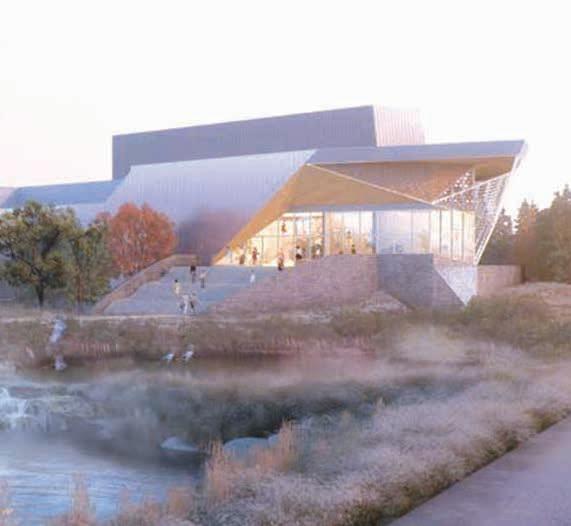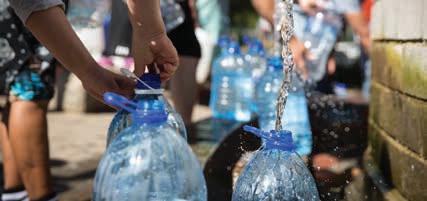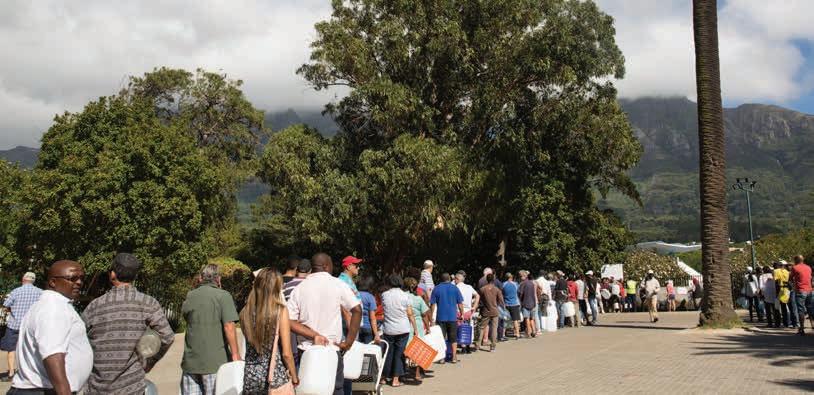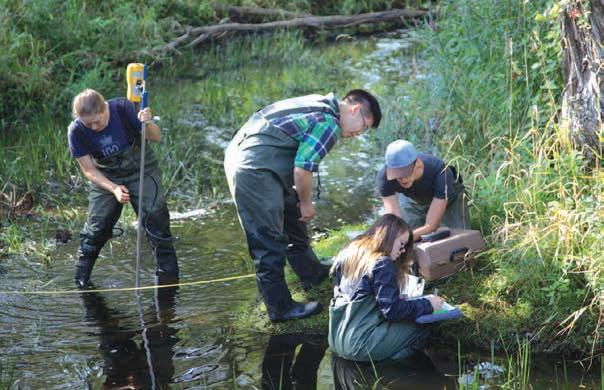
8 minute read
Water Quality Centre
TM: Trent’s a very recent memory for you. Tell me how your Trent experience is impacting the work you do now.
AK: I’m really happy you asked this question, because none of this would have happened without Trent. Professor Stephen Hill was always making sure that we were taking opportunities; he pushed us to always look beyond the scope of Trent. He nominated me for the Canadian Youth Environmental Leadership Scholarship and I was one of two Canadians to receive it, which was completely humbling for me. While receiving the award at the Globe Conference in Vancouver, I met a really amazing entrepreneur, Apoorv Sinha. I ended up working with him and joining his team, which led to me moving to California, living at NASA and working with Singularity University. That’s where I met Beth and Clare, the foundation of Majik Water. And it all started from an award I was nominated for at Trent. Those connections would never have been made otherwise.
It’s an example of seeing pieces that don’t make sense at the time falling together in very interesting ways, which happen if you keep your eyes open and see experiences as opportunities. At the time, of course, I could never have known I would end up where I am. But that’s the benefit of having mentors in your life—ones that have a bigger vision and can guide you towards things that are really good for you and your life. Trent has played an immense role in that.
TM: What advice do you have for students and young alumni?
AK: One of the biggest challenges and lessons has been what I call my “scope of control.” In short: “Cross that bridge when you get there.”
For many people, when they graduate university, or are in their 20s, there is information overload. It comes via social media or the internet. The amount of choices that seem to be out there is almost crippling. And so people can experience a sort of stand-still, or feel like they’re paralyzed because there’s this paradox of choice. They wonder what they could possibly do, or what impact they could possibly have.
For me, I think it is important to look to the immediate. Draw a circle around you and your community, and look at what you can do there—what you can do in your personal life at that stage or time. Because, while its good to dream big, it’s also important to focus on immediate next steps. I think this helps block out anxiety, or thoughts that overwhelm. That’s what I mean when I say, “cross that bridge when you get there.” Yes, things can happen in the

Cleantech Commons Key Part of Peterborough’s No. 1 Ranking for Watertech Start-Ups
Water Canada Magazine lists Peterborough as best place in Ontario for watertech start-ups to set up shop
With Trent University’s Cleantech Commons set to become Canada’s premier clean-technology research and innovation destination, it should be no surprise that Peterborough has been ranked as the number one city in Ontario for watertech start-ups to thrive.
Water Canada Magazine released the ranking in its fall edition and also listed Peterborough as the number two site across Canada, second only to Sherbrooke, Quebec. One of the reasons for Peterborough’s high ranking is Cleantech Commons at Trent University, which will host companies and start-up enterprises in the fields of clean technology, agro-biotechnology, water treatment and advanced materials.
Watertech companies can tap into Trent’s large source of market-ready graduates, world-class infrastructure—including the most comprehensive mass spectrometry facility in Canada—as well as more than $70 million worth of equipment.
Other Peterborough resources that make this city number one includes VentureNorth, the Innovation Cluster, Peterborough Region Angel Network, Fleming College’s Centre for Advancement of Water and Wastewater Technologies and the Peterborough and the Kawarthas Economic Development.
For companies who invest here, there’s a proven track-record of success. Previous cleantech companies that have thrived in Peterborough and area include Aclarus, which uses ozone to make water safe and clean; Noblegen, an advanced ingredients company that produces unique proteins, oils and flours; and Rainmaker Worldwide, which uses innovative technology to provide safe drinking water across the globe.
Learn more about Cleantech Commons at trentu.ca/cleantechcommons

Collecting natural spring water with five-litre plastic water bottle at Newlands natural spring in Cape Town, South Africa. Shutterstock.com_Mark Fisher
Lines of people waiting to collect natural spring water for drinking in the drought in Cape Town, South Africa.
future, but that’s over there. We also need to focus on what we’re doing in the present. Incremental steps.
That’s how we’ve gotten to we are with Majik Water. It’s been incredibly overwhelming—with the press, with expectations, with working with massive corporations. But you can’t let yourself go too far. You won’t be able to deliver well on what it is you’re doing right now if you keep getting distracted and stressed out by possibilities of the future, or things that are beyond your control. So, for me, it’s about starting small and doing that really well, and then keeping your eyes on the immediate next step. So cross those bridges when you get there. You don’t need to worry about things that haven’t happened yet. I don’t really know if that’s considered advice, but if I’m being honest, that is my kind of personal realization. TM: It must be exciting to cross bridges with people you admire. Tell me a bit about your team, and how it feels to be working with these particular people, making change.
AK: This is my favourite question of the day, because our team is everything. I have two cofounders: Beth Koigi, who is Kenyan, and Clare Sewell, who is British. We met in California, which is the cause for the question we get most frequently asked: “How the heck did you guys come together from three continents?” We met there, in Silicon Valley, and they are incredible. I’ve learned more from them than any other part of this experience.
They are both my seniors in age and also in experience. Beth ran her own water filtration company for five years in Kenya, very successfully. She has deep knowledge and expertise when it comes to Kenya. Clare worked in London for 10 years in management consulting and strategy. She went to Oxford for finance, so she has that strong backbone of understanding for how a business needs to run in order to work. She keeps us in line when we may want to do things that are infeasible or would take us off track.
We have a really good synergy and balance. Some of the biggest challenges have been personal ones in terms of coming together so quickly. We were strangers in June and we had a company by September. So the reality of that is that real life happens on the side. But the most beautiful and amazing things have happened. We can hardly believe it. But it has been a result exclusively of three women coming together and working together. We have a wider team as well, and they’re also an amazing support. And, of course, our partners in South Africa are our backbone.
For us, team is everything.


25 JANUARY 2018
THE TRENT UNIVERSITY WATER QUALITY CENTRE

The Water Quality Centre (WQC) is the most comprehensive mass spectrometry facility in Canada, possibly in North America. Instruments in the Centre are used to measure concentrations and abundances of atoms, elements and/or compounds by measuring the mass to charge (+ or -) values of ions. We can determine very, very low levels of elements such as mercury, lead, zinc, cadmium, copper, nickel in water and other environmental media, such as soils, sediments, aquatic biota (fish, algae, insects, mussels), etc. We also undertake product identification and quantitation of organic compounds, for example, pharmaceuticals, personal care products and other emerging contaminants (e.g., ibuprofen, acetaminophen, caffeine, triclosan, estrogens, etc.).
The instruments in the Centre are used by researchers—staff, faculty, graduate students and even undergraduate students—associated with many departments at Trent, i.e., School of the Environment, Chemistry, Physics, Biology, Anthropology, Environmental & Life Sciences.

Our analyses include: • compound specific isotope analyses • stable isotopes (e.g., C/N, 18O/16O,
Mg, Si, Fe, Zn, Hg, U) and radiogenic (e.g., Sr, Pb, Nd) isotope ratios • single particle analysis • metal(oid) speciation (e.g., Se, As, Cr) • emerging contaminants (e.g., pharmaceuticals, personal care products) • volatile fatty acids (VFAs) • total Hg (no sample preparation required for solids) • methyl-Hg • transition metal scans • determination of low concentrations (ppt or ppq) of most metals • P, S, Ca, Mg, Na, K analyses
Don’t be fooled by our name!
Biological material (food products, plants, invertebrates, bird eggs and feathers, fur), sediments, soils, fly ash, municipal wastewaters, industrial byproducts and process waters, also can be analyzed.
We have expanded!
We outgrew our first lab and expanded into a second lab. The original lab now houses our ICP-MSs including: a Varian 820, Thermo XSeries, Agilent 8800, Nu Attom, Nu Plasma 2 and Nu Plasma 1700 in addition to a Teledyne Leeman Prodigy ICP-OES. The second lab, located just down the hall, houses our “organic” MSs including: an AB Sciex Q-Trap 5500, Thermo Orbitrap Q-Exactive, Bruker SolarixXR FTICR (the first in Canada), Isoprime CF-IRMS (for delta C/N analysis) and a Nu Horizon (for compound specific IR analysis). Research areas at the Centre include: • cycling of trace metals (e.g., uranium) in lakes and catchments • source partitioning of mercury input into lakes • new methods to measure radioactive elements at ambient levels • the release of pharmaceuticals from waste treatment facilities • analysis of proteomes • metal(oid) speciation analysis • isotope ratio determination • lake ecosystem nanosliver project (LENS) • metabolites of ash trees attacked by the Emerald Ash Borer • binding of ligands to proteins • identifying and quantifying plant hormones (e.g., cytokinins)
In total, researchers at the Water Quality Centre have been successful in winning nine major Canada Foundation for Innovation (CFI) awards.
For additional information including news and events, facilities, contact info and more, please visit trentu.ca/wqc











